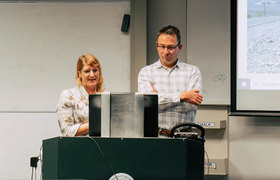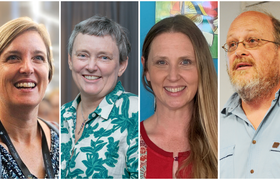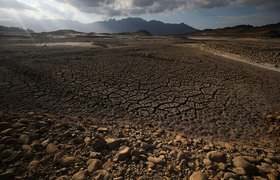Collaborating for enhanced management of climate change risk in cities
13 September 2023 | Story Natalie Simon. Photo UCT News. Read time 7 min.
The University of Cape Town’s (UCT) Climate Research in Collaboration with Society is a transdisciplinary research project. It seeks to bring together a range of scientific expertise, with local government officials, to build a peer community working towards enhanced climate risk response.
Climate change is arguably one of the greatest current global challenges. While the details around its impact may still be uncertain, it is understood that the world is set to experience a growing intensity and frequency of extreme climate events.
Cities are key players in climate change mitigation and adaptation.To respond effectively to climate threats, city officials can develop more relevant, useable information which speaks directly to their decision-making needs by building new modes of collaboration. This is what the National Research Foundation (NRF)-funded Community of Practice (CoP) in Climate Research in Collaboration with Society sets out to achieve.
“The CoP is a programme within the NRF to encourage cross-disciplinary collaboration,” said Professor Bruce Hewitson, the co-principal investigator on the Climate Change CoP and the director of the Climate Systems Analysis Group (CSAG) at UCT. “And this particular CoP is also working across sectors, directly with city officials, to build a community of peers to address the multifaceted challenge of climate change and how it plays out in cities.”
Working with city partners for water
Professor Hewitson’s expertise lies in physical climate research. This includes understanding fundamental climate processes, regional climate variability and change.
Professor Cristina Trois from the University of KwaZulu-Natal focuses on waste management and climate change. Professor Coleen Vogel from the University of the Witwatersrand brings expertise in governance and decision making, vulnerability and adaptation, and disaster risk reduction, among other things. These are the lead research collaborators in this CoP. Together their focus covers South Africa’s three largest cities: City of Cape Town, eThekwini Metropolitan Municipality, and the City of Johannesburg. With additional research partners from the University of the Western Cape (UWC) and the University of Limpopo.
The CoP is focused particularly on water-related issues in the three respective cities – everything from fresh water supply to wastewater management and water infrastructure. The work is to be undertaken in close collaboration with the relevant city officials to ensure the science is aligned with the operational and planning realities of the cities.
“If you think of a city as a system, that system can become functionally impacted as climate pressures increase and move closer to potential systemic failure.”
“Our work is focused particularly on supporting decision making around climate events that impact cities,” said Hewitson. “If you think of a city as a system, that system can become functionally impacted as climate pressures increase and move closer to potential systemic failure. What we are trying to do here is explore how the city’s options change as a system is impacted with growing climate pressures.”
Hewitson points to the Cape Town drought (2015–2018) as an example of an extreme case. Even before the drought began, there were increased water demands due to a hot year. The subsequent multi-year reduction in rainfall led to management options becoming increasingly constrained.
Co-creating useable science for decision making
This is where the relationship with city officials as stakeholders comes in. There is all too often an incomplete match between the information produced by scientists, and the information needed by decision makers, especially in relation to questions of uncertainty. In the face of increasing climate change, these issues urgently need greater attention.
“The problem with the science–policy relationship is that the messages delivered by scientists are easily over-interpreted as robust predictions,” said Hewitson. “We deliver our messages with various caveats and limitations, but those tend to get lost. At the same time, for scientists to produce useable knowledge, we need to understand the pressures and challenges decision makers are up against. We need to be answering the most relevant research questions for a specific context.”
For Hewitson, the way to overcome these challenges is through the creation of a “peer community of learning” where scientists meet with city officials in an ongoing and sustainable dialogue; a mutual learning exchange that can continue beyond the project time frame.
“The driving idea behind this is that the researcher gains a deeper understanding of the realities of the city operations, and the cities come away with a more nuanced understanding of the science and its limitations.”
“The driving idea behind this CoP is that the whole is greater than the sum of its parts. When you bring all the disciplines together, you get a richer understanding of what is going on.”
It also matters who the scientists are interacting with. They are working with city officials in operations. These are the people at the coalface of decision making and planning, who are responsible for the operational translation of policy into practice.
Key to this CoP is that it does not begin from a blank sheet. All three core researchers have strong experience engaging with city officials and are leveraging established relationships and a strong foundation of existing knowledge.
To further extend the collaboration, the three CoP partners are working with colleagues from other universities in each region, all of which bring unique expertise in particular areas. In Cape Town, for instance, UWC has come on board as a partner based on their strong expertise in water management, especially around ground water.
“The driving idea behind this CoP is that the whole is greater than the sum of its parts. When you bring all the disciplines together you get a richer understanding of what is going on,” said Hewitson. “But what is also critical is truly understanding the context in which you are working. To do this you have to step outside of your own environment and see the problem as your stakeholders see it.”
Christina Pather, the director of Research Support Enterprise at UCT’s Research Office, said: “The NRF’s CoP instrument has been a conduit for UCT researchers to foster inter- and transdisciplinary collaborations with institutions across the country, where research findings have been translated into policy recommendations and real-world applications.”
One of the roles of this directorate at the Research Office is to serve as the interface between researchers and funding bodies like the NRF, helping to support them in their grant applications and management.
“We are confident that this newly formed CoP, led by Professor Hewitson who has a wealth of experience in climate systems through his SARChI Chair, will replicate the same level of influence as our other CoPs,” said Pather. “Along with additional advantages such as enhancing capacity building and forging enduring collaborations with significant stakeholders like the three metropolitan areas.”
 This work is licensed under a Creative Commons Attribution-NoDerivatives 4.0 International License.
This work is licensed under a Creative Commons Attribution-NoDerivatives 4.0 International License.
Please view the republishing articles page for more information.










